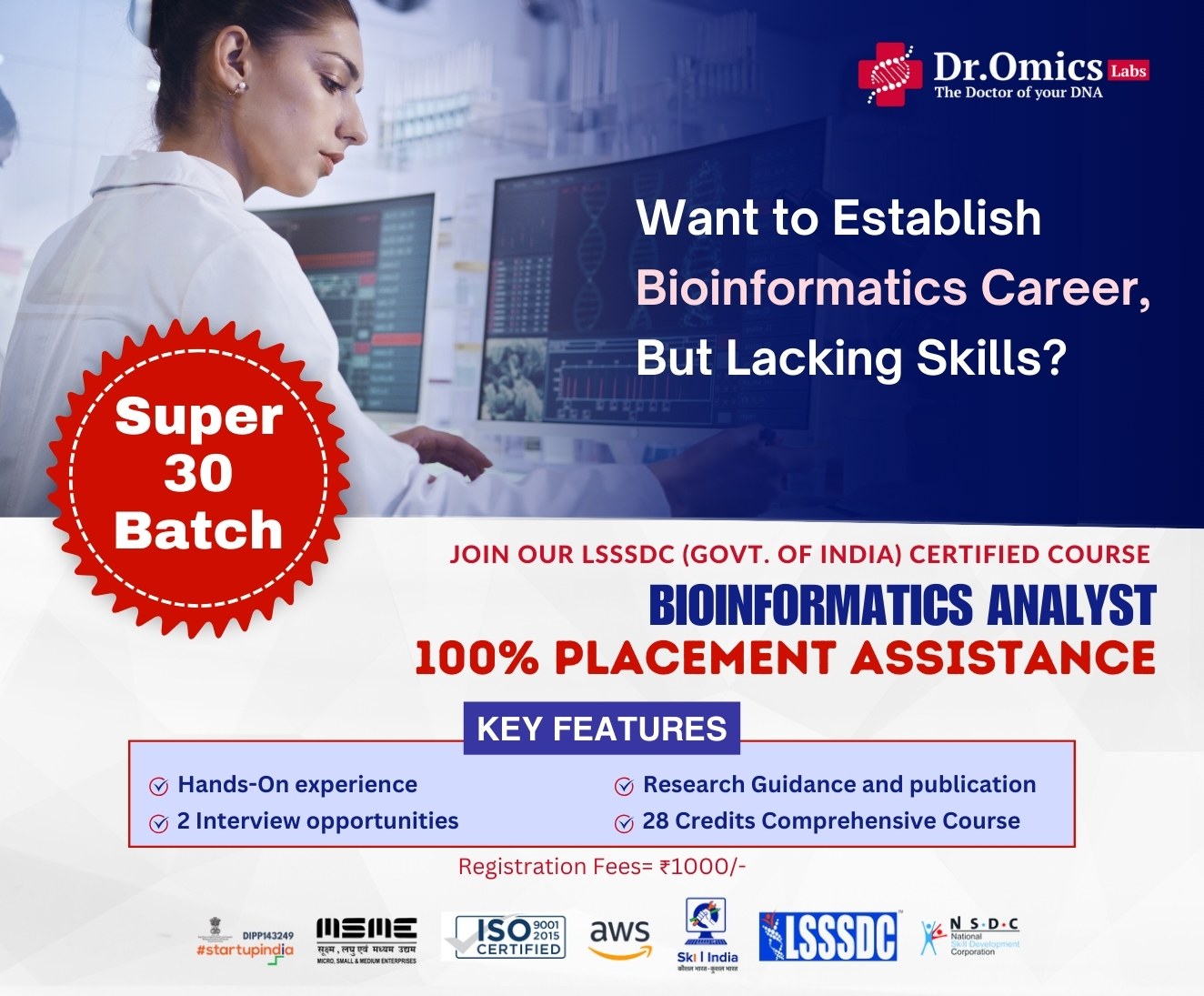MODULE : 1 INTRODUCTION TO BIOINFORMATICS
- Introduction to Bioinformatics and its Applications in Life Sciences
- Types of sequencing and NGS introduction
- Introduction to NGS applications
MODULE : 2 INTRODUCTION TO BIOINFORMATICS DATABASES
- NCBI overview
- NCBI Gene database
- UCSC Genome Browser Overview
- UCSC Genome Browser Hands-on Exercises
- Pubmed Database Introduction
- Clinvar Database Overview
- KEGG Database Overview and Exercises
- Protein Databases (UniProt)
- Ensemble Database
MODULE : 3 BIOINFORMATICS TOOLS
- Online BLAST Introduction and Exercises
- Standalone BLAST Setup and Exercises
- Standalone BLAST Advanced Exercises
- Multiple Sequence Alignment with ClustalW
- Multiple Sequence Alignment with MEGA
- Molecular visualization by Pymol
MODULE : 4 INTRODUCTION TO LINUX
- Overview and Installation of Linux
- Basic Commands for file handling
- Advanced Linux commands
- Package Management using Repository
- Package Management using Source Code
MODULE : 5 INTRODUCTION TO PYTHON PROGRAMMING
- Introduction to Python language
- Data types and data structure
- String Handling
- Data Structure
- Control Structure
- Function
- File Handling
- Data Manipulation
- Biopython
MODULE : 6 VARIANT CALLING ANALYSIS BY DNASEQ
- Introduction to NGS and DNAseq
- Basic Terminologies in NGS
- Understanding of SRA database
- Tools installation in Linux for Variation Calling
- Quality control (FastQC)
- Trimming of Reads (Trimmomatic)
- Indexing of Genome (BWA) and Alignment of Reads (BWA)
- Variation calling using GATK
- Variant Effect Prediction(VEP)
- Variation Visualization (IGV)
MODULE : 7 REFERENCE BASED RNA SEQ
- Introduction to RNAseq and it’s basic terminologies
- Tools installation in Linux for Gene Expression analysis
- Quality control (FastQC) and Trimming of Reads (Trimmomatic)
- Indexing of Genome and Alignment of Reads
- Normalization of Data (Cufflinks)
- Merging of Data (Cuffmerge) and Differential expression of genes (Cuffdiff)
MODULE : 8 DE-NOVO RNA SEQ ANALYSIS
- Tools installation for De-novo RNAseq
- Data downloading and Quality control
- Assembly Creation
- Abundance count estimation
- Generation of count matrix and DEG BLAST
- Understanding the DEG results
- Annotation of DEGs
- Enrichment Analysis
MODULE : 9 TARGETED METAGENOMICS
- Introduction to metagenomics
- Tools installation for metagenomics
- Data Downloading
- Quality control & Trimming
- Data importing in Qimme2
- Data quality check using DADA2
- Phylogenic Analysis
- Taxonomy Analysis
- Krona Plot
- Phylogenetic tree construction
MODULE : 10 CHEMINFORMATICS IN BIOINFORMATICS
- Drug Discovery and Development Process: Understanding QSAR Principles
- Introduction to Drug Discovery Process: drug discovery pipeline
- Role of Computational Methods
- Utilizing Biological Databases and Good Clinical Practices (GCP) Standards
- Chemical Structure Visualization
- Visual Representation of Biological Processes and Structures in Data Analysis
- Biomolecules- Properties and function
- Molecular Docking and Molecular Dynamics
- Pharmacophore Modeling
- Pharmacophore Modelling Applications
MODULE : 11 INTRODUCTION TO MACHINE LEARNING FUNDAMENTALS
- Machine Learning Fundamentals for Bioinformatics
- Linear Models and Nearest Neighbors
- Basics of Probabilistic Machine Learning
- Implementing Support Vector Machines (SVM)
- Introduction to Naive Bayes Classifier
- Decision Tree Classifier and Random Forest Classifier
- Logistic Regression in Bioinformatics
- Introduction to Clustering Algorithms
- Validation of Machine Learning Models
- Machine Learning for Image Analysis
MODULE : 12 STATISTICAL METHODS AND TOOLS FOR DATA EXTRACTION AND PREPARATION
- Introduction to Statistical Methods for Data Extraction and Preparation in Bioinformatics
- Exploring Data Characteristics and Distribution: Descriptive Statistics and Data Structures
- Understanding Correlation and Regression Analysis in Bioinformatics
- Probability and Bayes Theorem: Foundations for Statistical Inference
- Sampling Techniques and Distribution Theory in Bioinformatics
- Hypothesis Testing: Concepts and Methods for Data Analysis
- Statistical Tools for Data Management, Analysis, and Visualization in Bioinformatics
- Inferential Statistics: Making Valid Generalizations from Sample Data
- Interpreting Statistical Outputs for Informed Decision Making in Bioinformatics
- Practical Applications: Applying Statistical Methods to Solve Bioinformatics Problems
MODULE : 13 DATA MINING
- Introduction to Data Mining Concepts and Applications
- Data Preprocessing, Transformation, and Feature Engineering
- Clustering, Segmentation, and Anomaly Detection
- Association Rule Mining and Pattern Discovery
- Evaluating Data Mining Results and Model Interpretation
MODULE : 14 BASICS OF ALGORITHM DEVELOPMENT AND IMPLEMENTATION
- Program Design: Principles and Methods
- Basic Structures for Algorithm Development
- Efficient vs Naïve Algorithms
- Structured Programming and Divide and Conquer
- Object-Oriented Approaches and Greedy Algorithms
MODULE : 15 AWS- CLOUD COMPUTING
- Introduction to AWS
- Introduction to Compute Storage Databases
- Introduction to AWS Services Networking Security
- Deployment Strategies on AWS
- Management Tools for Bioinformatics Workflows on AWS
MODULE : 16 SQL
- Introduction to SQL (Structured Query Language) for Bioinformatics
- Basic SQL Syntax and Data Types: Queries, Statements, and Operators
- Retrieving Data from Relational Databases: SELECT Statements and Filtering
- Joining Tables: Understanding INNER JOIN, LEFT JOIN, and other Join Types
- Aggregating Data: Using GROUP BY and Aggregate Functions in SQL
MODULE : 17 DATA ANALYSIS WITH R PROGRAMMING
- Introduction and Installation of R
- Data Types, Variables, and Basic R Operations
- Data Structure
- File Handling
- Control Structure
- Function
- Package Management
- Data Manipulation
- Data Visualization
- Statistical Analysis
MODULE : 18 GENE EXPRESSION ANALYSIS USING MICROARRAY
- Introduction to Microarray
- Data Downloading
- Microarray Pipeline up to Normalization
- Microarray Pipeline till DEG
- Annotation of DEG
- Enrichment Analysis
- Network Analysis
- Volcano Plot
- Heatmap




Reviews
There are no reviews yet.